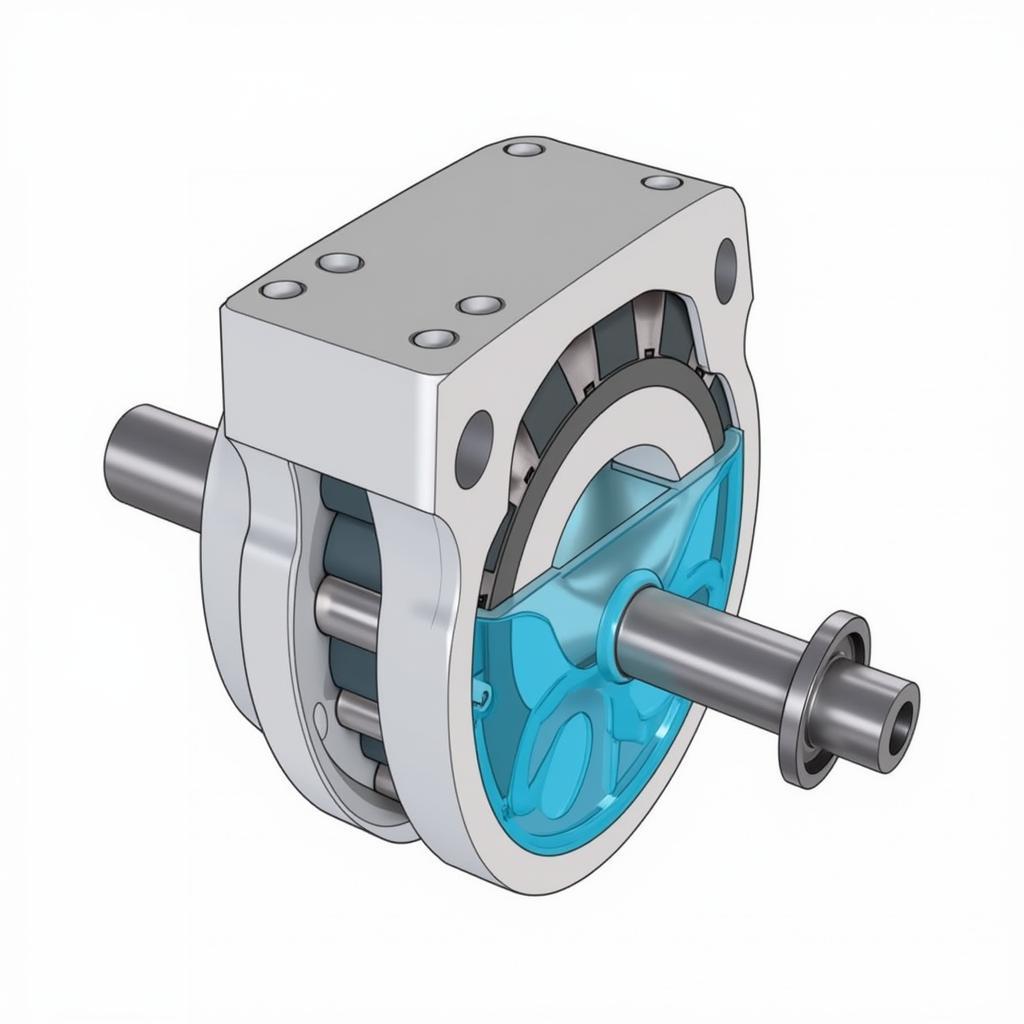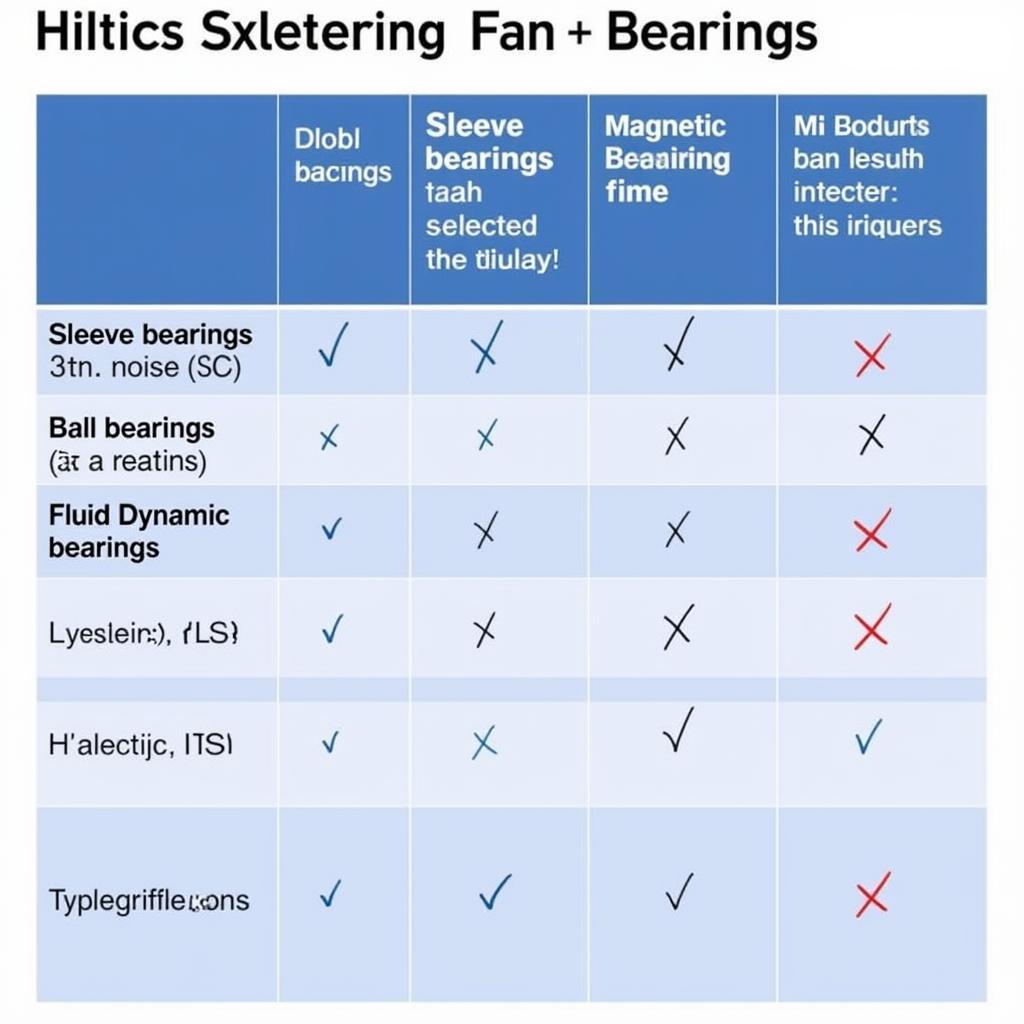Fan Bearing Technology is a critical component in the performance and lifespan of cooling systems, from computer processors to industrial refrigeration units. It directly impacts not only the noise level but also the efficiency and reliability of the fan itself. Choosing the right bearing type is essential for achieving optimal cooling performance and longevity. Let’s delve deeper into the world of fan bearing technology and explore the different types, their advantages, and their applications.
Understanding the Importance of Fan Bearing Technology
Choosing the right fan bearing technology can significantly impact a fan’s overall effectiveness. The bearing is the heart of the fan, enabling smooth rotation and minimizing friction. This, in turn, influences the noise produced, the amount of power consumed, and the lifespan of the entire system. A high-quality bearing ensures efficient operation, reduces wear and tear, and ultimately leads to a more reliable cooling solution.
Exploring Different Fan Bearing Types
Several types of fan bearings cater to different needs and applications. Each bearing type offers unique advantages and disadvantages, making it crucial to understand their characteristics when selecting the optimal solution for a specific cooling system.
Sleeve Bearings
Sleeve bearings are the most common and cost-effective option. They employ a simple design where the rotor shaft rotates within a sleeve lubricated with oil or grease. While economical, they are generally less durable and produce more noise than other bearing types, especially at higher speeds. Their lifespan is also shorter, particularly when operating in high-temperature environments.
Ball Bearings
Ball bearings utilize small metal balls between the rotor shaft and the bearing housing to reduce friction. This design offers several advantages over sleeve bearings, including lower noise levels, higher efficiency, and increased durability. They are also better suited for higher speeds and heavier workloads. However, they come at a slightly higher cost.
Fluid Dynamic Bearings (FDB)
Fluid dynamic bearings represent a significant advancement in fan bearing technology. They use a pressurized film of oil to suspend the rotor shaft, virtually eliminating friction. This leads to exceptionally quiet operation, improved efficiency, and extended lifespan compared to both sleeve and ball bearings. FDBs are often found in high-performance cooling systems where silence and reliability are paramount.
 Fluid Dynamic Bearing Diagram
Fluid Dynamic Bearing Diagram
Magnetic Bearings
Magnetic bearings levitate the rotor shaft using magnetic forces, completely eliminating physical contact and friction. They offer the ultimate in quiet operation and longevity. Although expensive, they are ideal for mission-critical applications requiring maximum reliability and minimal noise. They are commonly found in high-end servers and data centers where continuous operation is essential.
Choosing the Right Bearing for Your Needs
Selecting the right bearing depends on several factors, including noise tolerance, budget constraints, performance requirements, and expected lifespan. For basic cooling needs, sleeve bearings can suffice. For quieter and more durable solutions, ball bearings offer a good balance of cost and performance. Fan socket 775 may require specific bearing types depending on the CPU cooler design and its requirements. For high-performance systems where silence and longevity are crucial, FDBs or magnetic bearings are preferred. Refrigeration fan motors often utilize durable bearing types designed for continuous operation in demanding environments.
 Comparison Table of Different Fan Bearing Types
Comparison Table of Different Fan Bearing Types
How Does Fan Bearing Technology Impact Cooling Performance?
The bearing is the core component that dictates how efficiently the fan rotates. A smooth, frictionless rotation translates to better airflow and quieter operation. This directly impacts the effectiveness of the cooling system, enabling it to dissipate heat more effectively.
“Choosing the correct bearing is paramount,” explains leading cooling system engineer, Dr. Anya Petrova. “It’s the foundation upon which a reliable and efficient cooling solution is built.” Another expert, John Smith, a senior technician with 20 years of experience, adds, “The bearing directly affects the fan’s noise level and lifespan, two crucial factors for any cooling system.”
Conclusion
Fan bearing technology plays a pivotal role in the performance, longevity, and noise level of cooling systems. Understanding the different bearing types and their respective advantages is crucial for selecting the optimal solution for any application. Whether it’s a simple sleeve bearing or an advanced magnetic bearing, the right fan bearing technology ensures efficient cooling, minimizes noise, and maximizes the lifespan of your system. Fan bearing technology là gì is a crucial question to answer for any computer enthusiast or professional seeking optimal cooling solutions. Hi power fan 40 may also benefit from advanced bearing technologies to ensure quiet and efficient operation.
FAQ (Frequently Asked Questions)
- What is the quietest fan bearing type? Magnetic bearings offer the quietest operation due to the lack of physical contact.
- What is the most common fan bearing type? Sleeve bearings are the most common due to their cost-effectiveness.
- How long do fan bearings last? Lifespan varies depending on the type and usage, ranging from a few thousand hours for sleeve bearings to tens of thousands of hours for FDBs and magnetic bearings.
- How do I know what type of bearing my fan has? Refer to the fan’s specifications or manufacturer’s website.
- Can I replace a fan bearing? Replacing bearings is often complex and may not be cost-effective; it is often easier to replace the entire fan.
- What are the advantages of fluid dynamic bearings? FDBs offer quiet operation, long lifespan, and efficient performance.
- How does fan bearing technology affect noise? The type of bearing directly impacts the noise level of a fan, with sleeve bearings being the loudest and magnetic bearings the quietest.
For support, please contact us at Phone Number: 0903426737, Email: [email protected], or visit our address: To 9, Khu 6, Phuong Gieng Day, Thanh Pho Ha Long, Gieng Day, Ha Long, Quang Ninh, Vietnam. We have a 24/7 customer support team.


